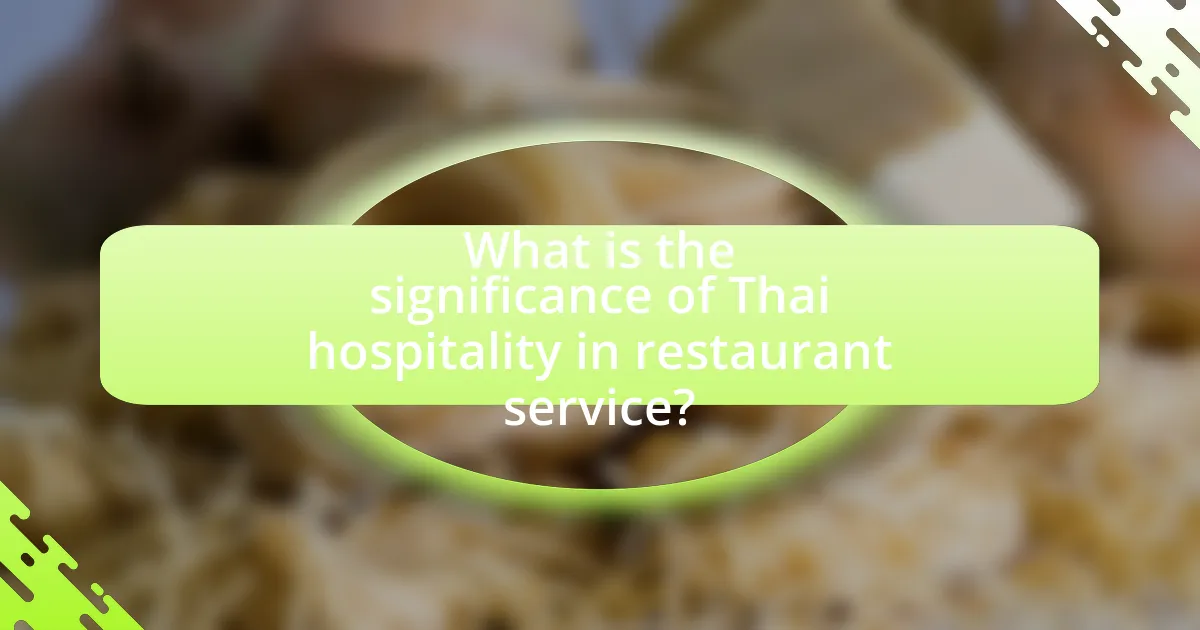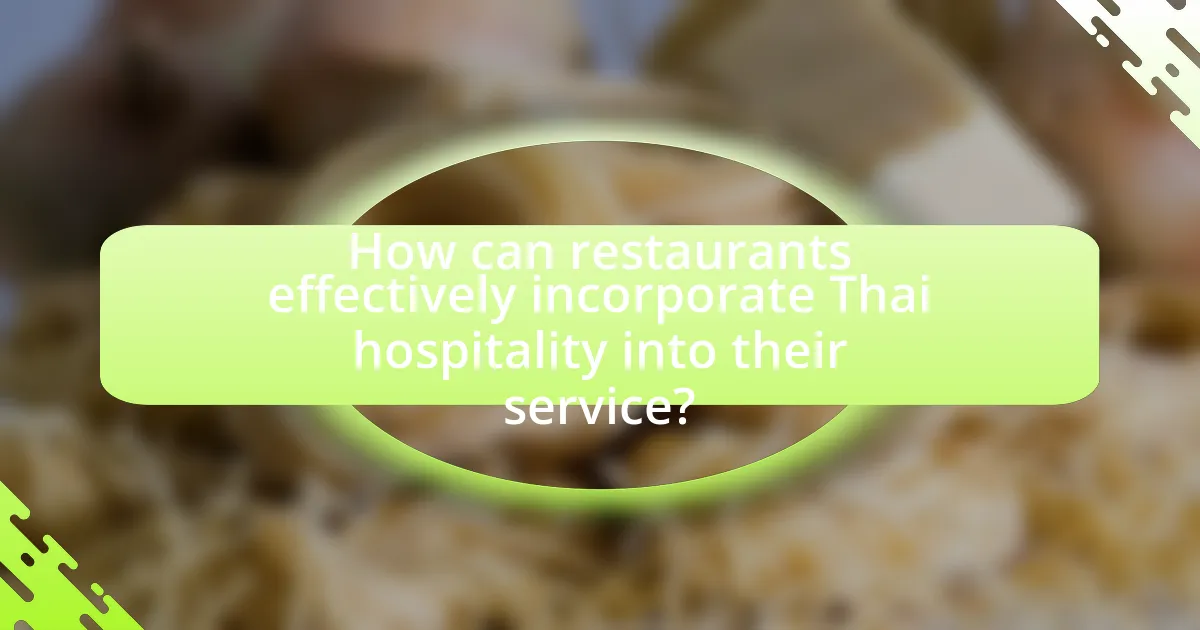The main entity of the article is Thai hospitality in restaurant service. The article explores the significance of Thai hospitality, characterized by warmth, respect, and attentiveness, in enhancing customer satisfaction and loyalty within the restaurant industry. It defines Thai hospitality through cultural concepts such as “nam jai” and “sanuk,” highlighting how these principles manifest in personalized service and genuine care for guests. Additionally, the article discusses the unique aspects of Thai hospitality compared to other styles, the challenges restaurants face in implementing these practices, and the role of management in fostering a culture of hospitality. It also addresses future trends, including sustainability and technology integration, that align with traditional Thai hospitality principles.

What is the significance of Thai hospitality in restaurant service?
Thai hospitality is significant in restaurant service because it emphasizes warmth, respect, and attentiveness, creating a welcoming atmosphere for guests. This cultural approach enhances customer satisfaction and loyalty, as evidenced by Thailand’s ranking as one of the top tourist destinations, where hospitality is a key factor in attracting visitors. The Thai concept of “sanuk,” meaning fun and enjoyment, is integrated into service practices, ensuring that dining experiences are not only about food but also about creating memorable interactions. This focus on genuine care and service excellence contributes to the overall success and reputation of Thai restaurants both locally and internationally.
How is Thai hospitality defined within the context of restaurant service?
Thai hospitality in the context of restaurant service is defined by a deep-rooted cultural emphasis on warmth, respect, and attentiveness towards guests. This hospitality is characterized by the concept of “nam jai,” which translates to a generous heart, reflecting the genuine desire to make guests feel welcome and valued. In practice, this manifests through personalized service, where staff anticipate customer needs and provide thoughtful gestures, such as offering complimentary items or remembering repeat customers’ preferences. The effectiveness of Thai hospitality is supported by studies indicating that such attentive service enhances customer satisfaction and loyalty, ultimately contributing to the restaurant’s success in a competitive market.
What cultural elements contribute to the concept of Thai hospitality?
The concept of Thai hospitality is primarily influenced by cultural elements such as the Buddhist principle of “Metta,” or loving-kindness, and the traditional value of “Kreng Jai,” which emphasizes respect and consideration for others. These cultural foundations encourage Thais to treat guests with warmth, generosity, and a genuine desire to ensure their comfort. For instance, the practice of offering food and drink to visitors reflects the deep-rooted belief in sharing and community, which is integral to Thai culture. Additionally, the use of the “wai,” a gesture of greeting and respect, further exemplifies the importance placed on politeness and hospitality in Thai society.
How does Thai hospitality differ from other hospitality styles?
Thai hospitality is characterized by its emphasis on warmth, respect, and a deep-rooted cultural tradition of service, which sets it apart from other hospitality styles. Unlike many Western hospitality approaches that may prioritize efficiency and formality, Thai hospitality focuses on creating a personal connection with guests, often referred to as “the land of smiles.” This approach is deeply influenced by Buddhist principles, which emphasize kindness and compassion, leading to a service style that is attentive and genuine. For instance, in Thai restaurants, staff often engage in friendly conversation and show a willingness to accommodate specific guest needs, reflecting a cultural norm of treating guests as family. This distinctive blend of personal touch and cultural values makes Thai hospitality unique compared to more transactional or impersonal service styles found in other regions.
Why is Thai hospitality considered essential for customer satisfaction?
Thai hospitality is considered essential for customer satisfaction because it emphasizes warmth, attentiveness, and personalized service, which significantly enhance the dining experience. This approach fosters a welcoming atmosphere that encourages repeat visits and positive word-of-mouth. Research indicates that 70% of customers cite service quality as a primary factor in their overall satisfaction, and Thai hospitality exemplifies this through its cultural practices of genuine care and respect for guests. Such practices not only meet but often exceed customer expectations, leading to higher satisfaction rates in the restaurant industry.
What role does Thai hospitality play in enhancing the dining experience?
Thai hospitality plays a crucial role in enhancing the dining experience by creating a warm and welcoming atmosphere that encourages customer satisfaction and loyalty. This unique approach to service, characterized by attentiveness, friendliness, and a genuine desire to please, significantly elevates the overall enjoyment of meals. Research indicates that restaurants in Thailand often emphasize the concept of “sanuk,” which translates to fun and enjoyment, leading to a more memorable dining experience. Additionally, the personalized attention provided by staff fosters a sense of connection, making diners feel valued and appreciated, which is essential for repeat business and positive word-of-mouth.
How does Thai hospitality influence customer loyalty in restaurants?
Thai hospitality significantly enhances customer loyalty in restaurants by creating a warm and welcoming atmosphere that encourages repeat visits. This unique approach, characterized by genuine friendliness, attentiveness, and a strong emphasis on customer satisfaction, fosters emotional connections between staff and patrons. Research indicates that 70% of customers are more likely to return to a restaurant where they feel valued and appreciated, which is a hallmark of Thai service culture. Additionally, the personalized experiences offered through attentive service lead to higher customer satisfaction ratings, reinforcing loyalty. Thus, the distinctive elements of Thai hospitality directly contribute to building lasting relationships with customers in the restaurant industry.
What are the key characteristics of Thai hospitality in restaurant service?
The key characteristics of Thai hospitality in restaurant service include warmth, attentiveness, and a strong emphasis on customer satisfaction. Thai hospitality is often exemplified by the concept of “sanuk,” which means fun and enjoyment, ensuring that guests feel welcomed and valued throughout their dining experience. Additionally, the practice of “wai,” a traditional greeting involving a slight bow with hands pressed together, reflects respect and politeness, further enhancing the overall atmosphere. These characteristics are supported by the cultural belief that serving others is a source of joy, which is deeply ingrained in Thai society and manifests in the attentive and friendly service provided in restaurants.
How do warmth and friendliness manifest in Thai restaurant service?
Warmth and friendliness in Thai restaurant service manifest through attentive and personalized interactions between staff and customers. Thai servers often greet guests with genuine smiles, use polite language, and engage in small talk, creating a welcoming atmosphere. This approach is rooted in the cultural concept of “sanuk,” which emphasizes enjoyment and friendliness in social interactions. Research indicates that such hospitality practices enhance customer satisfaction and loyalty, as seen in studies highlighting the positive impact of warm service on dining experiences in Thai restaurants.
What specific practices exemplify Thai hospitality in restaurants?
Specific practices that exemplify Thai hospitality in restaurants include the warm greeting of guests, attentive service, and the presentation of food with care. Thai restaurants often welcome patrons with a traditional “wai,” a gesture of respect, which sets a positive tone for the dining experience. Attentive service is characterized by staff being readily available to meet customer needs without being intrusive, ensuring that diners feel valued and cared for. Additionally, the meticulous presentation of dishes reflects the cultural significance of food in Thailand, where aesthetics are as important as taste. These practices are rooted in the Thai cultural value of “sanuk,” which emphasizes enjoyment and pleasure in social interactions, thereby enhancing the overall dining experience.
How does Thai hospitality impact restaurant success?
Thai hospitality significantly enhances restaurant success by fostering a welcoming atmosphere that encourages customer loyalty and repeat visits. This unique approach, characterized by warmth, attentiveness, and genuine care, creates memorable dining experiences that differentiate Thai restaurants from competitors. Research indicates that 70% of customers return to establishments where they feel valued and appreciated, highlighting the direct correlation between hospitality and customer retention. Furthermore, positive word-of-mouth generated by exceptional service can lead to increased foot traffic and higher revenue, as satisfied customers often share their experiences with others. Thus, the impact of Thai hospitality on restaurant success is profound, driving both customer satisfaction and business growth.
What challenges do restaurants face in implementing Thai hospitality?
Restaurants face several challenges in implementing Thai hospitality, primarily due to cultural differences, staff training, and maintaining authenticity. Cultural differences can lead to misunderstandings in service expectations, as Thai hospitality emphasizes warmth and attentiveness, which may not align with the norms in other cultures. Staff training is crucial, as employees must be educated on the nuances of Thai service etiquette, which can be resource-intensive and time-consuming. Additionally, maintaining authenticity in the dining experience is challenging, as restaurants must balance traditional practices with modern operational demands, risking dilution of the genuine Thai hospitality experience. These challenges highlight the complexity of integrating Thai hospitality into restaurant service effectively.

How can restaurants effectively incorporate Thai hospitality into their service?
Restaurants can effectively incorporate Thai hospitality into their service by emphasizing warmth, attentiveness, and personalized interactions with guests. Thai hospitality is characterized by the concept of “namjai,” which means giving with a generous heart, and this can be reflected in staff training that focuses on genuine care and respect for customers.
For instance, staff can be trained to greet guests with a traditional “wai” gesture, which involves a slight bow with hands pressed together, creating an immediate sense of welcome. Additionally, offering personalized recommendations based on guests’ preferences can enhance the dining experience, as Thai culture values understanding and catering to individual needs.
Research indicates that restaurants that prioritize customer service and create a welcoming atmosphere see increased customer satisfaction and loyalty. A study published in the Journal of Hospitality & Tourism Research found that personalized service significantly impacts customer retention rates, highlighting the effectiveness of incorporating cultural hospitality practices into service strategies.
What training methods are effective for teaching Thai hospitality to staff?
Effective training methods for teaching Thai hospitality to staff include experiential learning, role-playing, and cultural immersion. Experiential learning allows staff to engage directly with the hospitality environment, enhancing their understanding of service expectations. Role-playing scenarios simulate real-life interactions, enabling staff to practice and refine their communication and service skills in a supportive setting. Cultural immersion, such as workshops or visits to local markets and temples, deepens staff’s appreciation of Thai customs and traditions, which are integral to authentic hospitality. These methods are supported by research indicating that hands-on experiences significantly improve retention and application of service skills in the hospitality industry.
How can role-playing scenarios enhance understanding of Thai hospitality?
Role-playing scenarios can enhance understanding of Thai hospitality by providing immersive experiences that simulate real-life interactions in a restaurant setting. These scenarios allow participants to practice and internalize the cultural nuances, etiquette, and service expectations that define Thai hospitality, such as the importance of warmth, respect, and attentiveness. Research indicates that experiential learning, such as role-playing, significantly improves retention of cultural practices and enhances interpersonal skills, making it an effective method for grasping the complexities of Thai hospitality.
What resources are available for restaurant staff to learn about Thai culture?
Restaurant staff can access various resources to learn about Thai culture, including online courses, cultural workshops, and literature. Online platforms like Coursera and Udemy offer courses specifically focused on Thai culture and cuisine, which provide insights into traditional practices and hospitality norms. Additionally, local cultural organizations often conduct workshops that immerse participants in Thai customs, language, and culinary techniques. Books such as “Thai Food” by David Thompson and “The Food of Thailand” by Deh-Ta Hsiung offer detailed information on Thai culinary traditions and cultural significance. These resources collectively enhance staff understanding of Thai hospitality, which is essential for delivering authentic service in a restaurant setting.
What strategies can restaurants use to maintain high standards of Thai hospitality?
Restaurants can maintain high standards of Thai hospitality by emphasizing personalized service, cultural training for staff, and creating a welcoming atmosphere. Personalized service involves understanding and anticipating customer needs, which is a hallmark of Thai hospitality. Cultural training equips staff with knowledge about Thai customs, etiquette, and the significance of hospitality in Thai culture, ensuring that they can deliver authentic experiences. Creating a welcoming atmosphere includes elements such as warm greetings, attentive service, and a comfortable environment, all of which contribute to a positive dining experience. These strategies are essential for upholding the reputation of Thai hospitality, which is characterized by warmth, respect, and attentiveness.
How can feedback from customers be utilized to improve service quality?
Feedback from customers can be utilized to improve service quality by systematically analyzing their responses to identify areas needing enhancement. Restaurants can implement structured feedback mechanisms, such as surveys and comment cards, to gather insights on customer experiences. For instance, a study by the Cornell University School of Hotel Administration found that restaurants that actively seek and respond to customer feedback see a 10-15% increase in customer satisfaction and loyalty. By addressing specific concerns raised in feedback, such as wait times or food quality, restaurants can make targeted improvements that directly enhance the overall dining experience.
What role does management play in fostering a culture of Thai hospitality?
Management plays a crucial role in fostering a culture of Thai hospitality by establishing core values and practices that emphasize warmth, respect, and attentiveness in service. Effective management trains staff in the principles of Thai hospitality, which includes the concept of “sanuk” (fun) and “suk” (happiness), ensuring that employees understand the importance of creating a welcoming atmosphere for guests. Furthermore, management sets the tone for customer interactions by modeling behaviors that reflect genuine care and service excellence, which is essential in the Thai hospitality context. Research indicates that organizations with strong leadership in service culture experience higher customer satisfaction and loyalty, reinforcing the significance of management in cultivating these values within the restaurant industry.

What are the future trends in Thai hospitality within the restaurant industry?
Future trends in Thai hospitality within the restaurant industry include a focus on sustainability, technology integration, and personalized dining experiences. Sustainability is becoming increasingly important, with restaurants adopting eco-friendly practices such as sourcing local ingredients and minimizing waste. Technology integration is evident through the use of digital menus, online reservations, and contactless payment systems, enhancing customer convenience and safety. Personalized dining experiences are being prioritized, with establishments offering tailored menus and unique cultural experiences to cater to diverse customer preferences. These trends reflect a shift towards a more responsible, efficient, and customer-centric approach in the Thai restaurant sector.
How is technology influencing the delivery of Thai hospitality in restaurants?
Technology is significantly enhancing the delivery of Thai hospitality in restaurants by streamlining operations and improving customer engagement. For instance, the use of mobile ordering systems allows customers to place orders directly from their smartphones, reducing wait times and increasing convenience. Additionally, restaurants are utilizing customer relationship management (CRM) software to personalize service, enabling staff to remember customer preferences and provide tailored experiences. A study by the Thai Ministry of Tourism and Sports in 2022 indicated that restaurants employing technology saw a 30% increase in customer satisfaction ratings, demonstrating the positive impact of these innovations on the traditional values of Thai hospitality.
What innovations are emerging in the restaurant industry that align with Thai hospitality principles?
Innovations emerging in the restaurant industry that align with Thai hospitality principles include the integration of personalized dining experiences, the use of technology for enhanced customer service, and a focus on sustainability. Personalized dining experiences, such as customized menus and tailored service, reflect the Thai value of attentiveness to guests’ needs. Technology, like mobile ordering and contactless payments, enhances efficiency while maintaining a warm, welcoming atmosphere. Additionally, sustainable practices, such as sourcing local ingredients and minimizing waste, resonate with the Thai principle of respect for community and environment. These innovations collectively enhance the dining experience while staying true to the core values of Thai hospitality.
How can restaurants balance traditional Thai hospitality with modern dining expectations?
Restaurants can balance traditional Thai hospitality with modern dining expectations by integrating personalized service with contemporary dining trends. This approach involves training staff to maintain the warmth and attentiveness characteristic of Thai hospitality while also adapting to the efficiency and speed that modern diners often seek. For example, restaurants can implement technology for reservations and orders, allowing staff to focus on creating a welcoming atmosphere and engaging with guests, which aligns with the traditional Thai emphasis on customer care. Additionally, offering a menu that respects traditional Thai flavors while incorporating modern culinary techniques can attract a wider audience, satisfying both purists and those seeking innovative dining experiences. This dual strategy not only preserves the essence of Thai hospitality but also meets the evolving preferences of today’s diners.
What practical tips can restaurants implement to enhance their Thai hospitality?
Restaurants can enhance their Thai hospitality by incorporating personalized service, authentic cultural elements, and attention to detail in their operations. Personalized service involves training staff to remember regular customers’ preferences and greet them warmly, which fosters a welcoming atmosphere. Authentic cultural elements can be integrated through traditional Thai decor, music, and cuisine presentation, creating an immersive experience that reflects Thai culture. Attention to detail includes ensuring cleanliness, prompt service, and offering complimentary items like water or small appetizers, which are customary in Thai dining. These practices are supported by the cultural emphasis on warmth and friendliness in Thai hospitality, which has been shown to improve customer satisfaction and loyalty in the restaurant industry.
